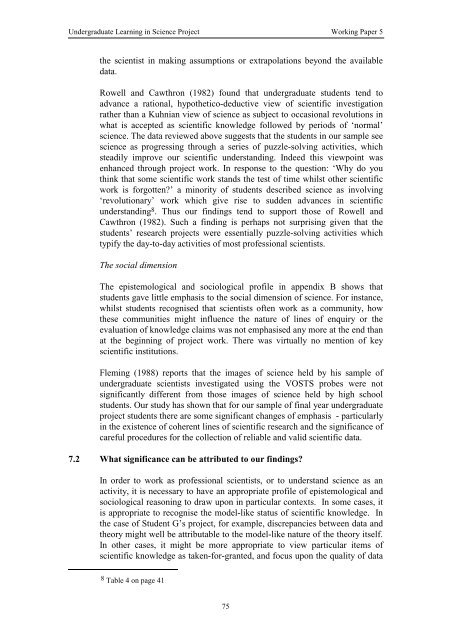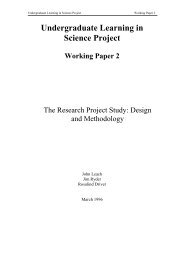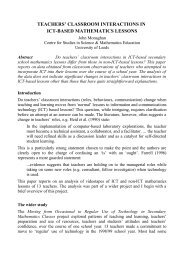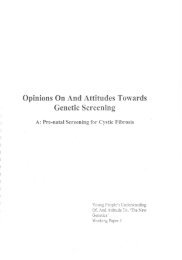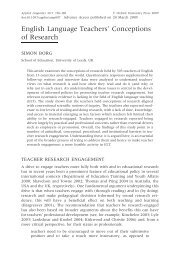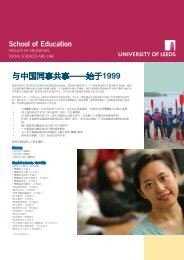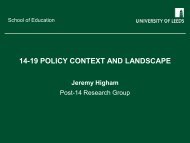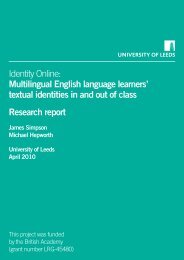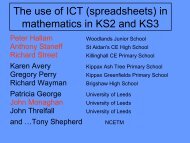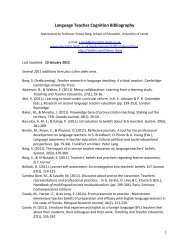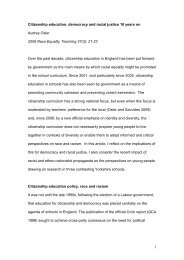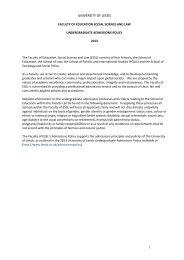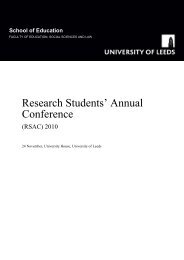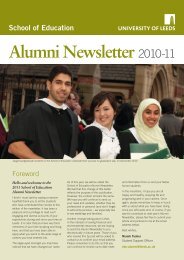Undergraduate science research projects and students - School of ...
Undergraduate science research projects and students - School of ...
Undergraduate science research projects and students - School of ...
Create successful ePaper yourself
Turn your PDF publications into a flip-book with our unique Google optimized e-Paper software.
<strong>Undergraduate</strong> Learning in Science Project Working Paper 5the scientist in making assumptions or extrapolations beyond the availabledata.Rowell <strong>and</strong> Cawthron (1982) found that undergraduate <strong>students</strong> tend toadvance a rational, hypothetico-deductive view <strong>of</strong> scientific investigationrather than a Kuhnian view <strong>of</strong> <strong>science</strong> as subject to occasional revolutions inwhat is accepted as scientific knowledge followed by periods <strong>of</strong> ‘normal’<strong>science</strong>. The data reviewed above suggests that the <strong>students</strong> in our sample see<strong>science</strong> as progressing through a series <strong>of</strong> puzzle-solving activities, whichsteadily improve our scientific underst<strong>and</strong>ing. Indeed this viewpoint wasenhanced through project work. In response to the question: ‘Why do youthink that some scientific work st<strong>and</strong>s the test <strong>of</strong> time whilst other scientificwork is forgotten?’ a minority <strong>of</strong> <strong>students</strong> described <strong>science</strong> as involving‘revolutionary’ work which give rise to sudden advances in scientificunderst<strong>and</strong>ing 8 . Thus our findings tend to support those <strong>of</strong> Rowell <strong>and</strong>Cawthron (1982). Such a finding is perhaps not surprising given that the<strong>students</strong>’ <strong>research</strong> <strong>projects</strong> were essentially puzzle-solving activities whichtypify the day-to-day activities <strong>of</strong> most pr<strong>of</strong>essional scientists.The social dimensionThe epistemological <strong>and</strong> sociological pr<strong>of</strong>ile in appendix B shows that<strong>students</strong> gave little emphasis to the social dimension <strong>of</strong> <strong>science</strong>. For instance,whilst <strong>students</strong> recognised that scientists <strong>of</strong>ten work as a community, howthese communities might influence the nature <strong>of</strong> lines <strong>of</strong> enquiry or theevaluation <strong>of</strong> knowledge claims was not emphasised any more at the end thanat the beginning <strong>of</strong> project work. There was virtually no mention <strong>of</strong> keyscientific institutions.Fleming (1988) reports that the images <strong>of</strong> <strong>science</strong> held by his sample <strong>of</strong>undergraduate scientists investigated using the VOSTS probes were notsignificantly different from those images <strong>of</strong> <strong>science</strong> held by high school<strong>students</strong>. Our study has shown that for our sample <strong>of</strong> final year undergraduateproject <strong>students</strong> there are some significant changes <strong>of</strong> emphasis - particularlyin the existence <strong>of</strong> coherent lines <strong>of</strong> scientific <strong>research</strong> <strong>and</strong> the significance <strong>of</strong>careful procedures for the collection <strong>of</strong> reliable <strong>and</strong> valid scientific data.7.2 What significance can be attributed to our findings?In order to work as pr<strong>of</strong>essional scientists, or to underst<strong>and</strong> <strong>science</strong> as anactivity, it is necessary to have an appropriate pr<strong>of</strong>ile <strong>of</strong> epistemological <strong>and</strong>sociological reasoning to draw upon in particular contexts. In some cases, itis appropriate to recognise the model-like status <strong>of</strong> scientific knowledge. Inthe case <strong>of</strong> Student G’s project, for example, discrepancies between data <strong>and</strong>theory might well be attributable to the model-like nature <strong>of</strong> the theory itself.In other cases, it might be more appropriate to view particular items <strong>of</strong>scientific knowledge as taken-for-granted, <strong>and</strong> focus upon the quality <strong>of</strong> data8 Table 4 on page 4175


